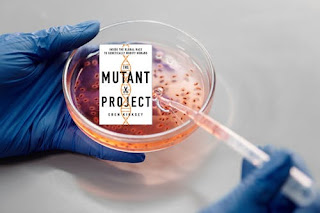I received a copy of this book from the publisher in exchange for an honest review.
Title: The Mutant Project: Inside the Global Race to Genetically Modify Humans
Author: Eben Kirksey
Release Date: 11.10. 20
Publisher: St. Martin's
Goodreads Summary:At a conference in Hong Kong in November 2018, Dr. He Jiankui announced that he had created the first genetically modified babies—twin girls named Lulu and Nana—sending shockwaves around the world. A year later, a Chinese court sentenced Dr. He to three years in prison for "illegal medical practice."
As scientists elsewhere start to catch up with China’s vast genetic research program, gene editing is fueling an innovation economy that threatens to widen racial and economic inequality. Fundamental questions about science, health, and social justice are at stake: Who gets access to gene editing technologies? As countries loosen regulations around the globe, from the U.S. to Indonesia, can we shape research agendas to promote an ethical and fair society?
Eben Kirksey takes us on a groundbreaking journey to meet the key scientists, lobbyists, and entrepreneurs who are bringing cutting-edge genetic engineering tools like CRISPR to your local clinic. He also ventures beyond the scientific echo chamber, talking to disabled scholars, doctors, hackers, chronically-ill patients, and activists who have alternative visions of a genetically modified future for humanity.
The Mutant Project empowers us to ask the right questions, uncover the truth, and navigate this brave new world.
My Review:
I love all types of books about genes, genetic testing, gene editing, etc. and I think the non-fiction books about the subject are even more interesting than the fiction ones. I love questioning my own ethics when I read and changing my mind about what I think is acceptable and what is not--the line is thin and ever-changing.
In addition to learning all the new ways genetic modifications can be applied, I am also interested in who gets to make the rules surrounding the science and how to hold scientists accountable. How do you make scientists from a variety of countries adhere to the same rules, especially when different countries hold different social, religious, and ethical beliefs? For example, "secular Chinese medial ethics draws on Confucian thought, which assumes that a person becomes a person after it is born, not before. Intellectuals in China do not generally share the preoccupations of Western or Christian bioethicists who think that human life is sacred from the moment of conception." This core belief allows for Chinese scientists to move forward in areas where the United States pulls back, allowing them to take the lead in the field. Will lawmakers have to take all religions and moral beliefs into account to make laws which the entire scientific community must follow?
Author Eben Kirksey touches on so many ideas, obstacles, and possibilities within this science and includes a wide variety of viewpoints. I recommend this book to anyone who loved The Immortal Life of Henrietta Lacks, who is interested in diseases and medical inequality, or to anyone simply looking to educate themselves on the science occurring right now that could affect human evolution.




